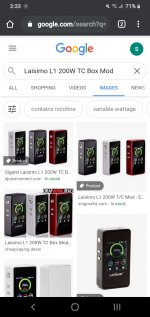The ratings that are printed on the battery wrap and/or printed on the sticky label (if any) can usually not be trusted in any way, and, the same thing goes for the ratings that the typical online battery vendors─also including trusted battery vendors like the ones that
@gsmit1 linked to─just copy onto their website because, for the most part anyway, they fail to make clear distinctions between useless pulse ratings and the true CDR (Continuous Discharge Rating).
"True CDR" = the number reported by Mooch ("Battery Mooch" on YouTube) in his
List of Battery Tests, his
18650 Battery Ratings Table, and his
Regulated Mod Recommended Batteries Table (2nd thumbnail).
As for the 3.7V rating that you mention, it is the
nominal voltage of the battery so, it doesn't say anything much. In fact the 3000mAh rating doesn't say that much either, as the vaping time you get is not determined by it in any way that can be called reasonably accurate. That's just because a battery runs more efficiently the further you stay below the CDR when talking about how many amps your regulated mod draws from each battery, for how you vape. Running it less efficiently causes a battery to
waste more of the energy held by it, and, the energy that it can deliver (as a function of how many amps will be drawn from it) is the Wh number, not the mAh number. The CDR is also the recommended safety limit BTW. For a regulated mod, a quick rule of thumb to calculate battery safety is to multiply the CDR by three and then multiply that by the number of batteries that the regulated mod uses. This will give you the wattage number that is recommended to stay at or below. So, for example, with a pair of Samsung 30Q batteries or a pair of Sony/Murata VTC6 batteries, that would be three times 15A times two batteries giving you a maximum limit of up to 90 watts of recommended "safety".
"Safety" = vaping on typical round cells we use for vaping can never be "safe", as none of these batteries were ever designed to be used outside a fully protected battery pack with a protection circuit, and, there are no hard and fast numbers that either are safe or are unsafe to vape on them.
That being said, running a battery less efficiently also causes it to internally heat itself up faster, as does choosing a battery the CDR of which is lower by a few amps. Letting the battery temperature reach up higher due to it generating more heat and not giving it time to cool sufficiently back down again, especially if done repeatedly and for prolonged periods of time, accelerates battery aging. As does pushing the battery harder. So, at 80 watts on a pair of Samsung 30Q batteries, for example, this might or might not become a problem to you, also depending on what's your definition of "occasionally" and "for a short time", and also depending how warm you let your batteries get before you allow them to cool down. (I.e., heavy chain vaping versus longer waiting in order to avoid getting them more than just a tad warm-ish). Despite that holding a battery in your fist for multiple seconds isn't a very accurate way to measure the battery's temperature, you can still feel if it's only lukewarm instead of being fairly hot. It basically just means that you can extend the life of your batteries, significantly, if you try to avoid getting them too hot the whole time and you don't usually push them too hard. Mooch's personal YouTube channel has a video episode with several other useful tips on the particular subject of extending battery life, plus a wealth of the world's best info about batteries-and-vaping. Major parts of the professional experience he has gained comes from designing battery test setups and advanced test procedures for clients in the high tech industry. And he also vapes.
Finally, for more frequent (...) vaping at 80 watts or thereabout on a dual 18650 regulated mod, you might want to consider getting a pair of Molicel P26A batteries. At that power level, the P26A gives more Wh (and more vaping time) than the Samsung 30Q or the Sony/Murata VTC6, and heats up slower... because it is a 25A battery.

